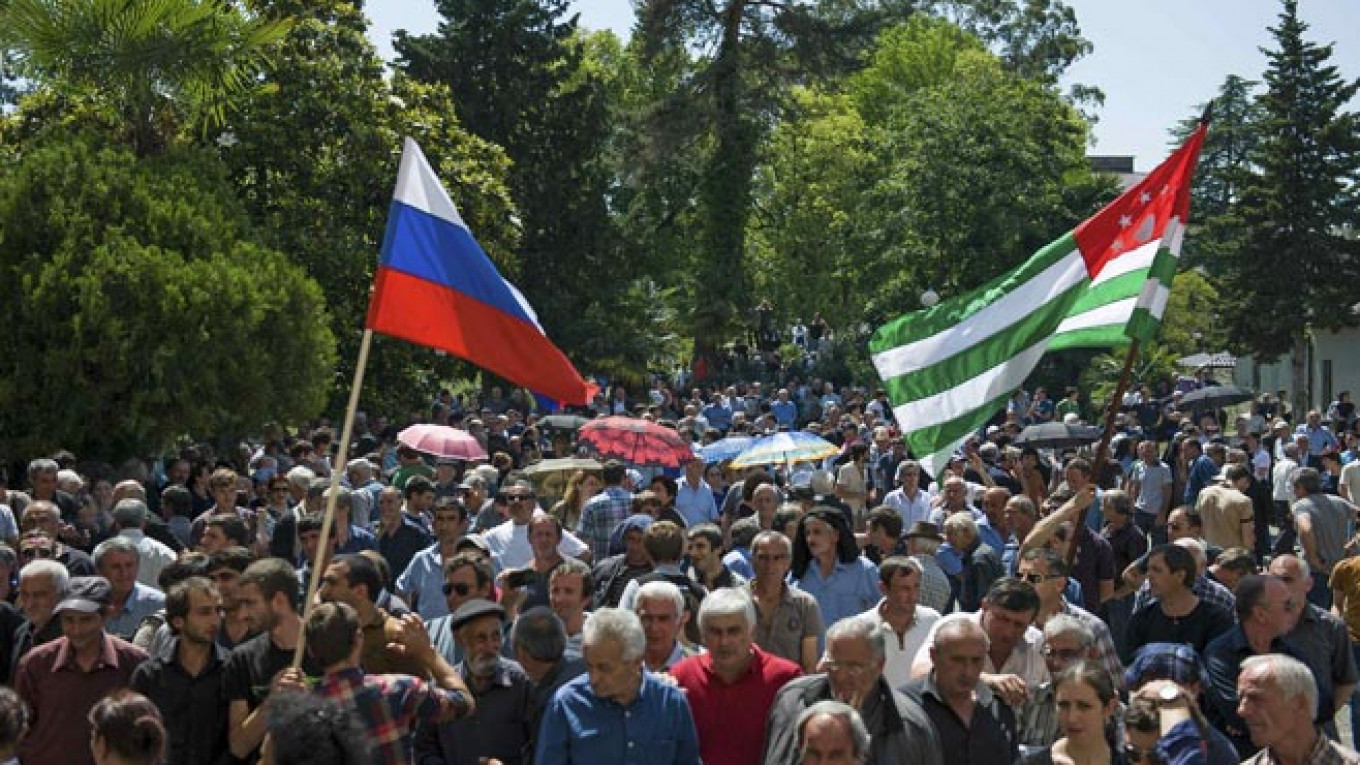The president of Abkhazia, Alexander Ankvab, resigned on Sunday. This political crisis came as no surprise to observers: the internal conflicts in that break-away province of Georgia have increased dramatically as of late. However, the more Abkhazia and nearby South Ossetia depend on Russia as a patron and guarantor of its statehood, the more difficulty it will have in achieving any significant development.
Only four countries in the world have recognized the independence of Abkhazia and South Ossetia: Russia, Nicaragua, Venezuela and Nauru. The two republics thereby distanced themselves from Georgia, but now find themselves dependent on the whims of Moscow's financial largesse.
Two-thirds of Abkhazia's national budget and 90 percent of South Ossetia's relies on funding from Russia. That degree of financial aid only weakens the republics and gives the wrong incentive to the ruling elite, who now focus primarily on how to obtain as much money as possible from Russia.
The main problem is that for five years Moscow has failed to create a development strategy for the new states that it helped or caused to come into existence. Russia had the moral obligation to continually assist Abkhazia and South Ossetia establish laws on private property, develop their justice systems and governmental bodies and to help them gain international recognition — if for no other reason than to reduce the burden on Russia's budget.
However, Moscow provided only sporadic support and the Russian officials that profit most from those subsidies have a stake in maintaining the status quo.
A large reason for the republics currently weak economies is the lack of incentives for investment, foreign or otherwise. For example, Abkhazia has significant legal restrictions on the purchase of property.
Of course, its closed political system and underdeveloped institutions present even greater obstacles to growth. The region has also suffered due to the legal battle over its status as a disputed territory, a factor that also gives its residents a siege mentality and discourages meaningful investment from anyone but Russia.
Resolving legal issues, at least for Abkhazia, will be only half the battle in attracting foreign investment. Abkhazia has long struggled with inter-ethnic tensions between Abkhaz and ethnic Georgians. According to political scientist Sergei Markedonov, the government's decision to hand out passports to ethnic Georgians, a sizable population in Abkhazia, spurred some of the discontent that eventually ousted Ankvab.
The Abkhazian population still clearly recalls its bloody 1992 to 1993 war of independence with Georgia and is very concerned about their independence. Many of these ethnic Georgians living in Abkhazia retained their Georgian citizenship, and the fear of a Georgian "fifth column" is understandable.
In a poll conducted last year by the Czech agency Medium Orient, most Abkhaz favored maintaining independence — 38.9 percent in its current form and 20 percent as a separate state within the CIS. Only 28.4 percent of respondents wanted Abkhazia to become part of Russia — down from 68 percent in 2006. Interestingly, the Abkhaz people combine their desire for independence with a willingness to receive financial assistance from Russia and to criticize their own president for the misuse of those funds.
Andrei Sinitsyn is a correspondent and op-ed contributor for Vedomosti. This comment appeared in Vedomosti.
A Message from The Moscow Times:
Dear readers,
We are facing unprecedented challenges. Russia's Prosecutor General's Office has designated The Moscow Times as an "undesirable" organization, criminalizing our work and putting our staff at risk of prosecution. This follows our earlier unjust labeling as a "foreign agent."
These actions are direct attempts to silence independent journalism in Russia. The authorities claim our work "discredits the decisions of the Russian leadership." We see things differently: we strive to provide accurate, unbiased reporting on Russia.
We, the journalists of The Moscow Times, refuse to be silenced. But to continue our work, we need your help.
Your support, no matter how small, makes a world of difference. If you can, please support us monthly starting from just $2. It's quick to set up, and every contribution makes a significant impact.
By supporting The Moscow Times, you're defending open, independent journalism in the face of repression. Thank you for standing with us.
Remind me later.


